Unveiling the Power of Drizzle ORM: Key Features that Skyrocketed My Productivity
Want to supercharge your dev productivity? Get a glimpse into how Drizzle ORM, with its well-structured docs and powerful features, could be a game-changer for your projects.

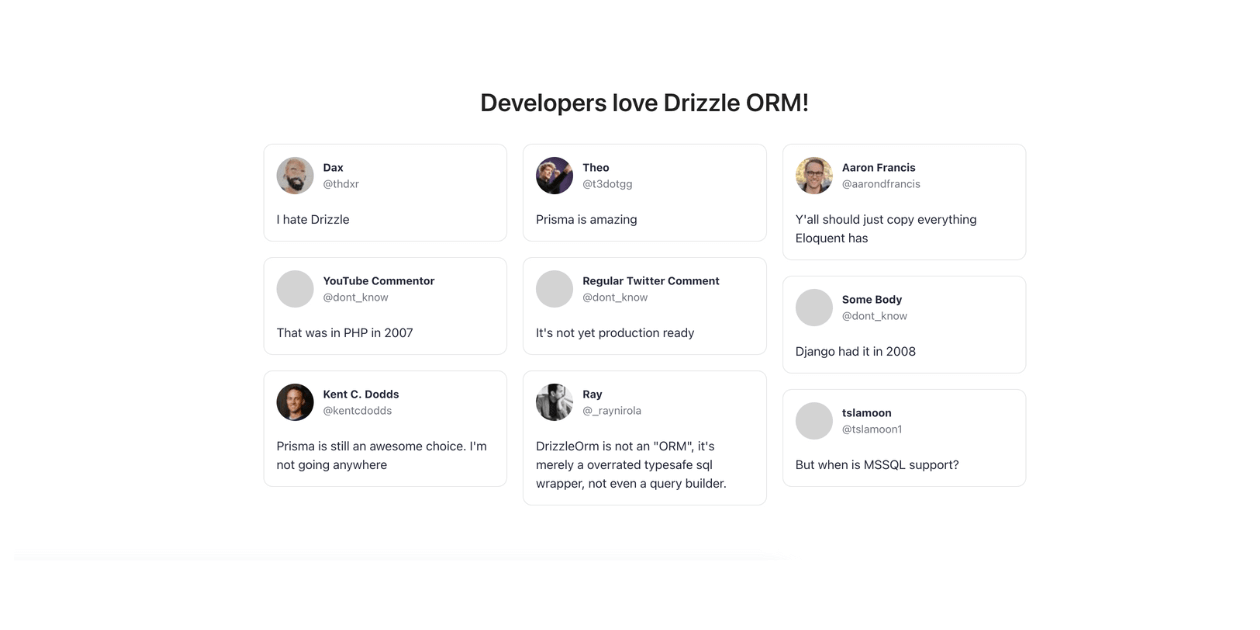
Inspired by a few of my favorite tech YouTubers, namely Theo and Josh, I was intrigued to try out Drizzle ORM after hearing their rave reviews. Having since incorporated Drizzle into several projects, I've discovered numerous features that have not only enhanced my productivity but have also made the development process more enjoyable. Want to know why Drizzle has made such a difference? Stay with me as I dive into its game-changing features.
1. Great Structured Documentation with a lot of examples
Beyond the very funny marketing landing page (see blogpost cover), Drizzle also finally launched a highly anticipated documentation. What I particularly like is that the documentation is well structured and broken down logically.
First there is Drizzle ORM:
Drizzle ORM is a TypeScript ORM for SQL databases designed with maximum type safety in mind.
And then there is Drizzle Kit :
Drizzle Kit - is a CLI companion for automatic SQL migrations generation and rapid prototyping
For each of these they have the most important topics displayed nicely in a sidebar on the left, and then a table of contents for this particular page on the right sidebar.
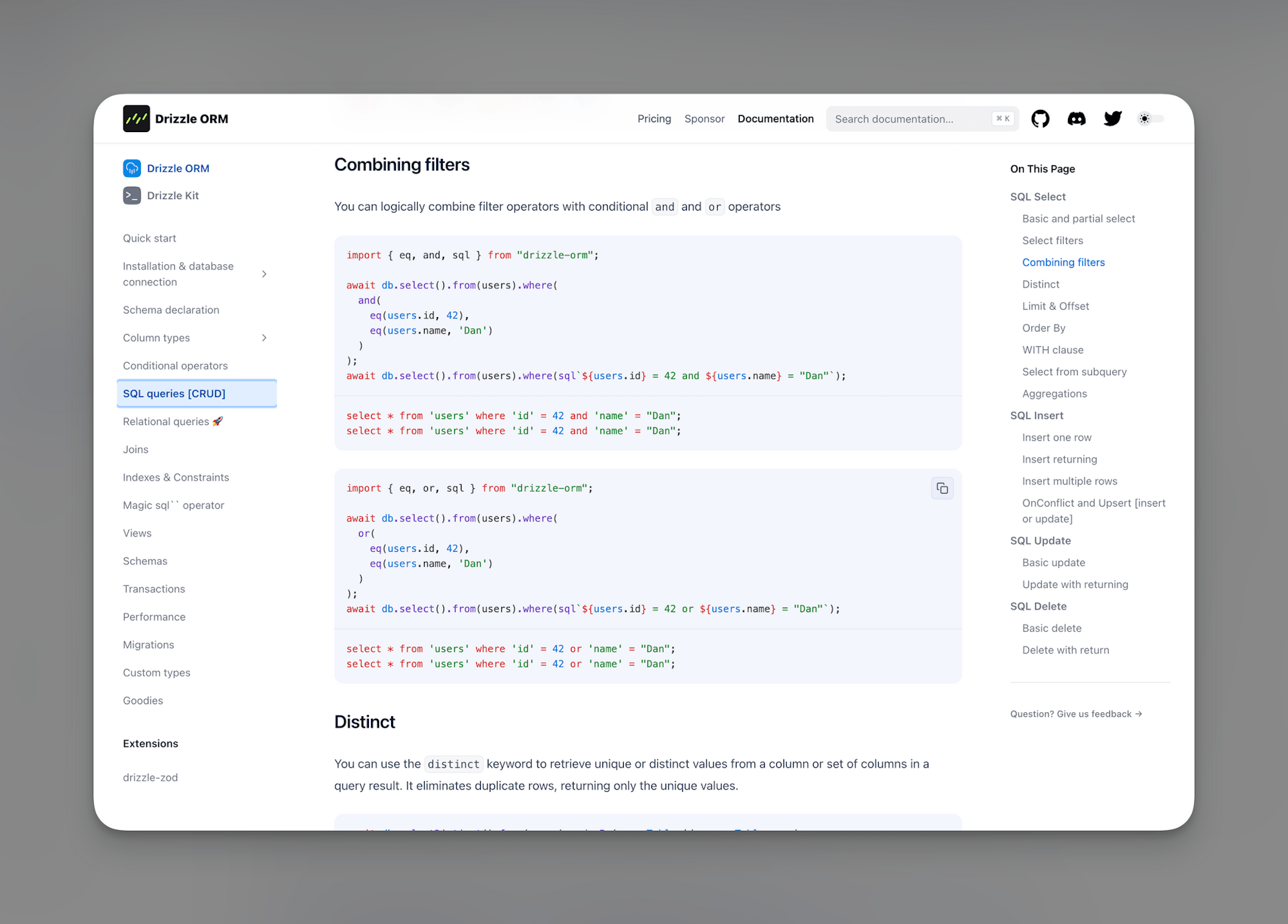
2. Easy to remember SQL Query Syntax
When adopting a relatively new library, it can be a struggle to remember the specific API syntax. If you know SQL though, you already know Drizzle.
The ORM's main philosophy is "If you know SQL, you know Drizzle ORM". We follow the SQL-like syntax whenever possible, are strongly typed ground up, and fail at compile time, not in runtime.
Check out some of these examples:
Simple Select
Drizzle Syntax:
const result = await db.select().from(users);
SQL Syntax:
select * from 'users';
Simple Select with Filters
Drizzle Syntax:
await db.select().from(users).where(eq(users.id, 42));
SQL Syntax:
select * from 'users' where 'id' = 42;
Select Distinct
Drizzle Syntax:
await db.selectDistinct().from(users).orderBy(usersTable.id, usersTable.name);
SQL Syntax:
select distinct "id", "name" from "users" order by "users"."id", "users"."name";
3. Support for Complex SQL Queries
"While most ORMs manage to handle the simpler examples adequately, Drizzle takes it a step further. It truly excels in dealing with complex TypeScript joins, navigating terrain where many others struggle. Moreover, Drizzle shines by offering advanced database features, such as transactions, thereby enhancing its functionality and flexibility
Smart Type Inference on Joins
In the following there's a real life query from one of my projects, that has a lot of conditions, filters and all sort of things going on that I use for server side filtered table:
With all of this complicated logic Drizzle still gives me perfect type annotations.
Even with partial select, when you expect any joined table to be potentially have null types for every field, Drizzle shines:
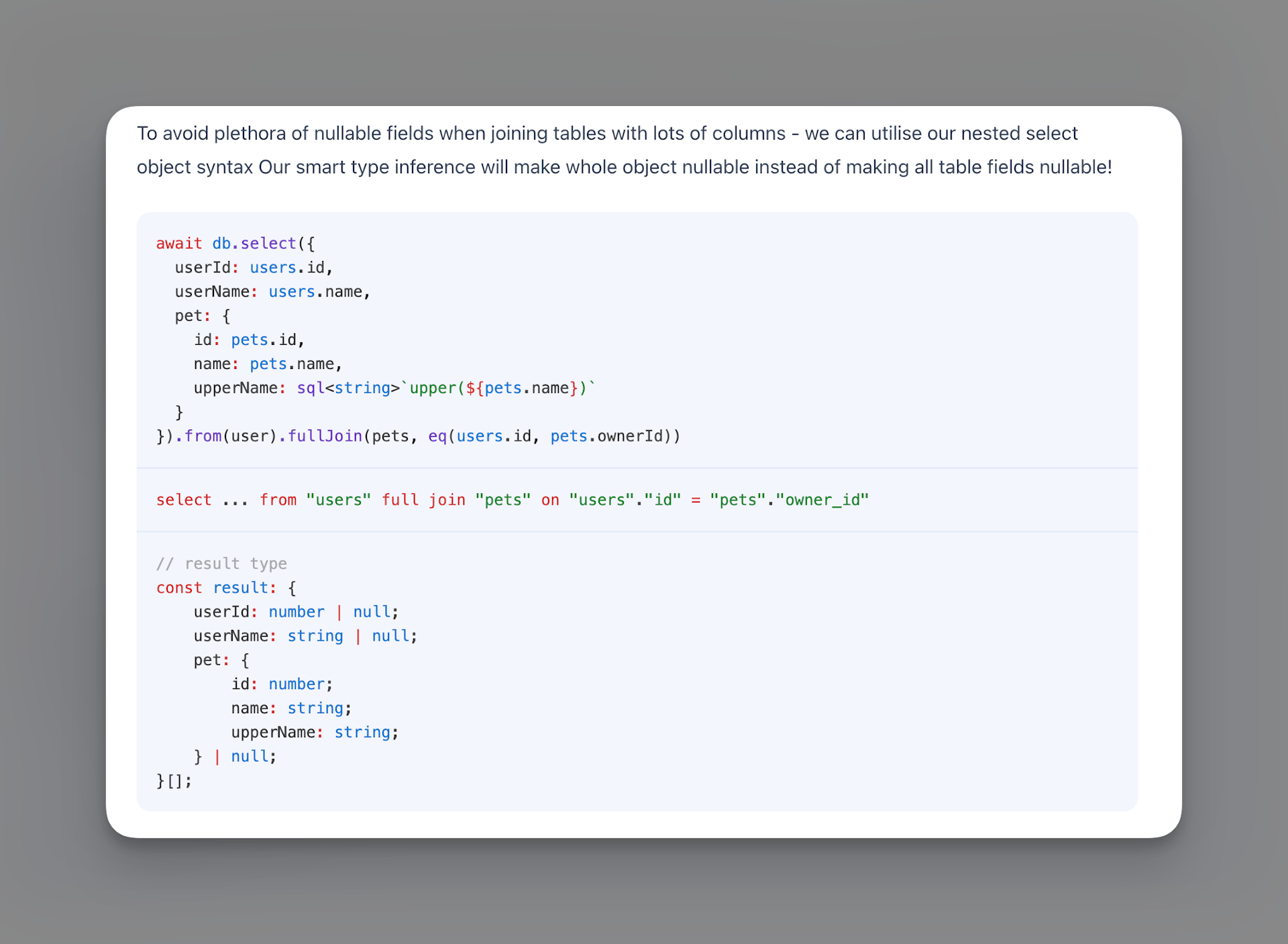
4. Transaction & Prepared Statement Support
When I work with a relational database, I normalize my tables and keep everything neatly organised. However, this approach can introduce complexities when it comes to populating these tables. Let's explore this issue using a practical example from my SaaS, BacklinkGPT.com.
In the process of creating a record for my campaign backlink prospect table, a sequence of insertions must take place first. Here are the necessary steps:
- Insert the
websiteinto thewebsitestable of a and get the correspondingidto link it to a backlink prospect - Insert the
contactinto thecontactstable and get the correspondingidto link it to the backlink prospect - Insert the backlink prospect with the just inserted
website_id,contact_idand other backlink prospect info - Finally, insert the
backlink_prospect_idas well as thecampign_idto finally get thecampaign_backlink_prospect_id
Being a big fan of Supabase, I tried to do this first with the Supabase SDK and wasn't happy with the implementation. However, the implementation fell short of my expectations. Whenever an insert operation failed, I found myself writing extensive logic to undo the changes.
What would truly solve this issue is the ability to use transactions to manage these operations:
SQL transaction is a grouping of one or more SQL statements that interact with a database. A transaction in its entirety can commit to a database as a single logical unit or rollback (become undone) as a single logical unit.
Unfortunately, as of now you can only do this with Supabase by calling a supabase function with the .rpc method. While this could technically be a great solution, I did not like to have this complex logic stored in a postgres function with no version control.
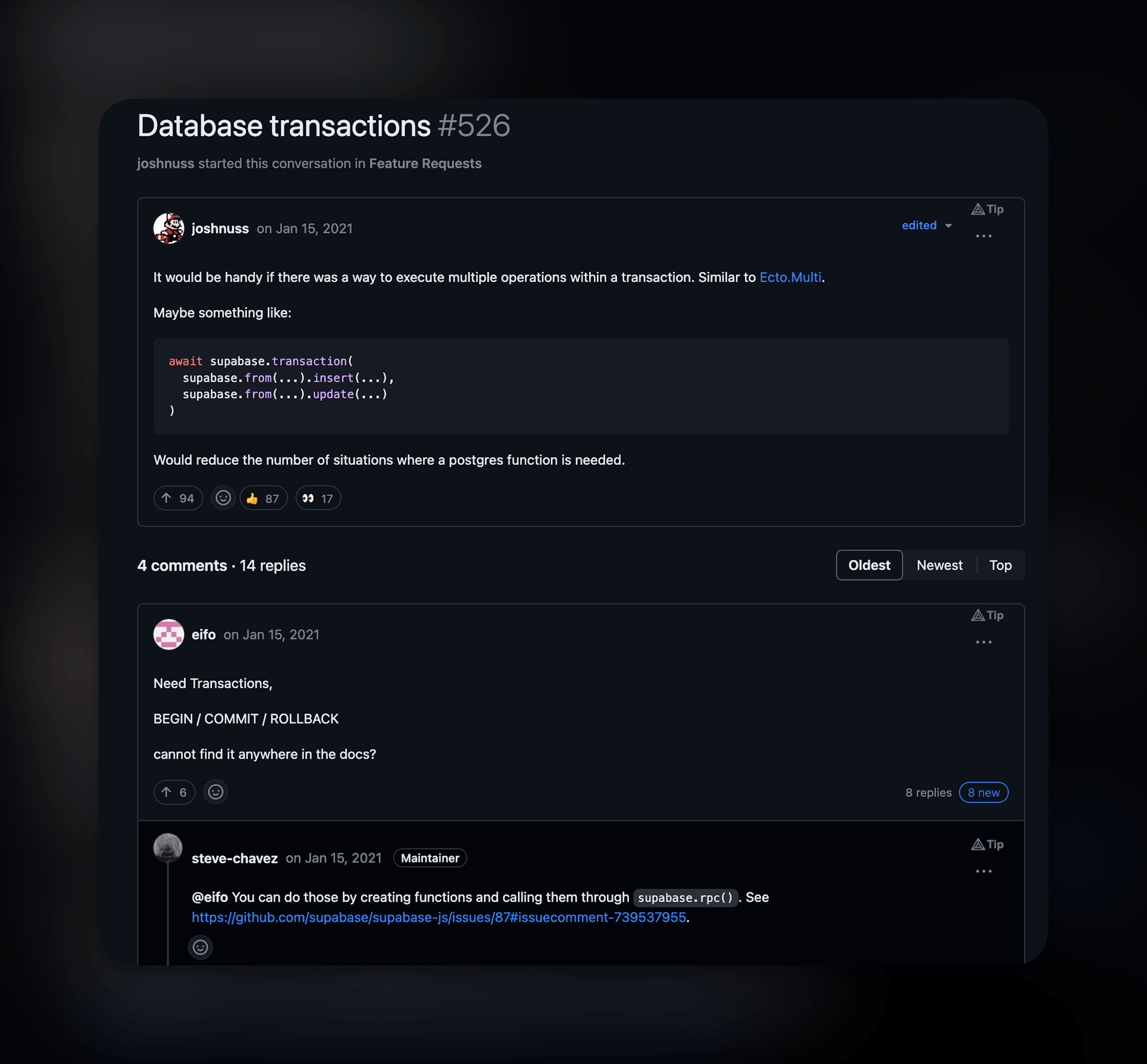
Luckily, Drizzle ORM supports transactions, and it was quite easy to implement with their excellent docs:
Prepared Statements
Something I have not tried yet, but would love to see the performance benefits of are prepared statements:
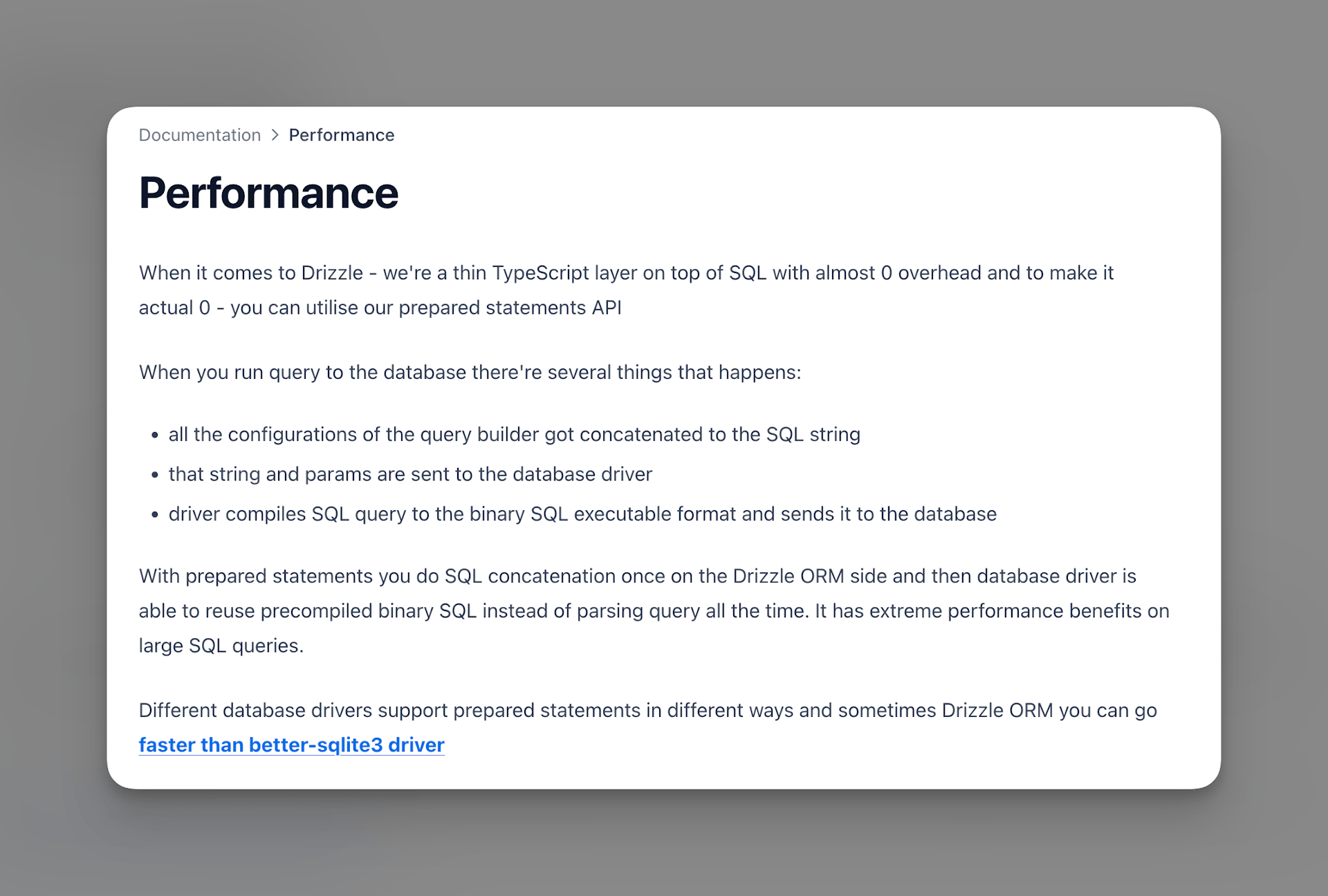
I had a very interesting chat with Alex Blokh who's part of the Drizzle Team:

Sadly, I figured that not all Databases (e.g. Neon) can currently leverage these, but I am sure that with time there might be an opportunity:
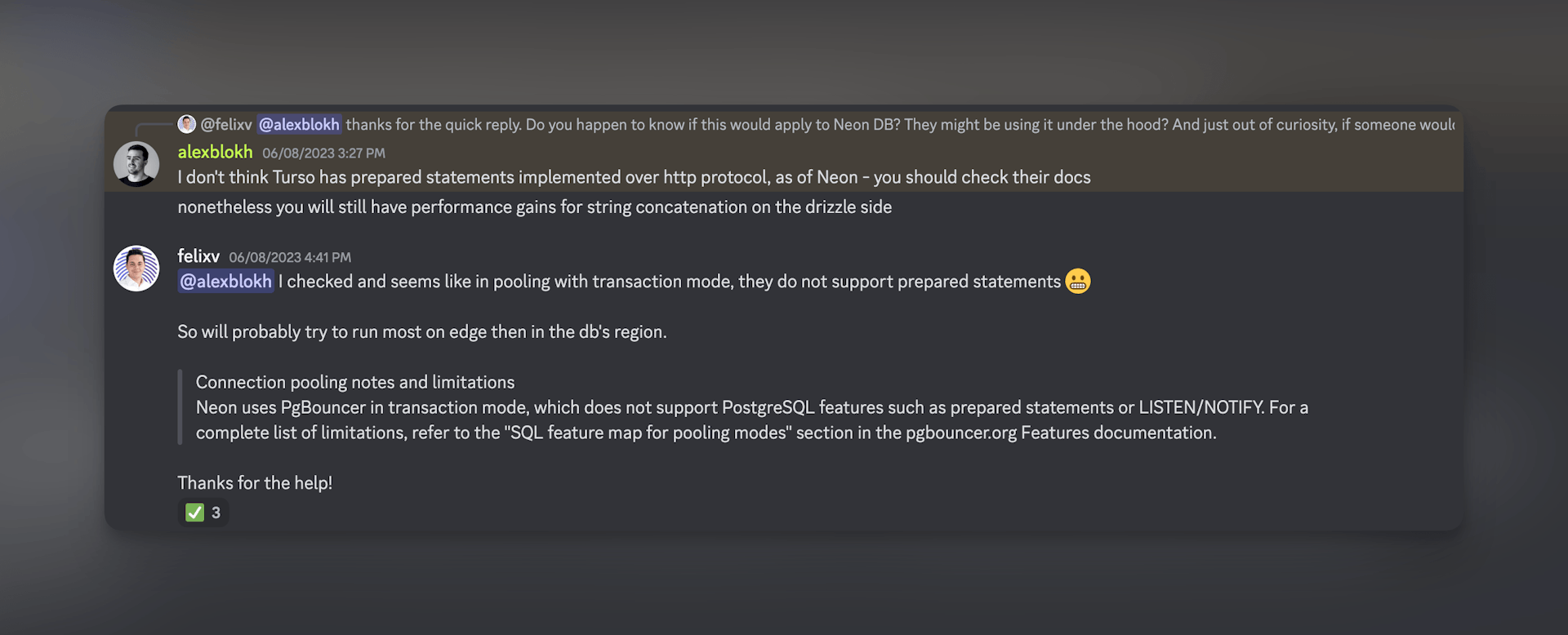
5. No more manual creation of zod models or types
By far this is my favourite feature, as it makes you so much more productive as a developer. The power behind Drizzle reminds me a bit about Theo's video:
Every Developer will eventually have some sort of similar workflow for inserting data into a table:
- Create a table with schema.
- Create a
zodmodel for input parsing and type-safety based on form table requirements. - Derive types from
zodmodel and pass types and schema to e.g.react-hook-formresolver. - Extend or modify
zodschema to match real table schema before inserting.
All of this is super manual, error prone and very annoying especially if you make schema changes and you have to manually adjust everything.
Drizzle solves all of these issues perfectly with the drizzle-zod plugin.
drizzle-zodis a plugin for Drizzle ORM(opens in a new tab) that allows you to generate Zod(opens in a new tab) schemas from Drizzle ORM schemas.
Here's an example that I used at BacklinkGPT:
- First I create my schema:
Drizzle Schema Creation
- Then I can easily create an insert schema and types based on the table, which I can feed into
react-hook-forms:
Drizzle-zod create insert schema feature
Notice how I can even refine the schema on the fly to make the uderId and id optional just for react-hook-form as I want to provide those automatically in my server action.
- I can then create my server action function and easily pass in all the data, while getting reminded from the
onboardingSurveystypes to provide still myid,userIdandcreatedAt:
Reuse of drizzle-zod schema.
Building forms and moving types and schemas between client and server components has never been so easy and fun!
6. Drizzle Kit Introspect: Create types for an existing db
When I initially considered Drizzle, I was a bit skeptical. I anticipated a lot of effort in creating a complete schema to get typings for my existing Supabase project. However, I was pleasantly surprised - all it took was a single command and voila, my types were ready:
drizzle-kit generate:pg --custom
drizzle-kit introspect:{dialect}command lets you pull DDL from existing database and generateschema.tsfile in matter of seconds.
With this feature you can really test the waters before committing fully.
7. Drizzle Studio
Just after one month of launching Relational Queries the Drizzle team launched a database-browser kit for the Drizzle ecosystem.
Though it's still in beta and undergoing continuous development, I am thoroughly excited about utilizing a GUI for inspecting and editing data. I have been using the PostgreSQL Explorer VS Code extension, which is excellent in its own right, but lacks the ability to edit data directly.
Wrapping Up: Drizzle Could Be Your Next Favorite Tool!
As you can gather from my journey, I've become a major fan of Drizzle and it's now my go-to ORM for all new projects.

From Good to Great: Boosting Dev Experience with Drizzle ORM & Directus
Discover the synergy of Directus and Drizzle ORM. Elevate your TypeScript experience, streamline database operations, and supercharge your web development workflow in just a few steps.
But, in the interest of giving you the full picture, I'll also share a few areas where Drizzle might not be perfect yet and where I stumbled upon some challenges.
Figuring out how to do push migrations for PSQL via script
The drizzle team recently released the drizzle-kit push:pg command. Here's the when to use it:
When do you need to use the 'push' command?
-
During the prototyping and experimentation phase of your schema on a local environment.
-
Whenyou are utilizing an external provider that manages migrations and schema changes for you (e.g., PlanetScale).
-
If you are comfortable modifying the database schema before your code changes can be deployed.
If you wanna see first the migrations and then push them to the DB without having to copy and manually execute all the statements, I came up with these scripts:
And then having it working in package.json :
So if someone's struggling like me, I hope this is helpful.
If you found this post helpful and are eager for more insights like this, don't hesitate to follow me on Twitter and subscribe to my newsletter. That way, you'll be the first to know when I share new tips, tools, and insights to boost your productivity as a developer.
And, if you're about to dive into Drizzle, I'd love to hear about your experiences.
Happy coding!